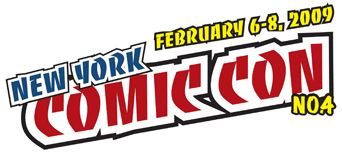• The economy may be circling the drain, but initial reports indicate that's had little effect on the mood, or the crowd size, at New York Comic Con. "The logline for the show is definitely 'What recession?'," writes Heidi MacDonald. "More than one person referred to the con as an 'escape' from the realities of unemployment, and global deflation."
• That's not to say money was far from everyone's thoughts. At Friday's My Cup O' Joe panel, a fan asked how Marvel decides which comics will cost $2.99 and which ones will cost $3.99.
"Those are hard decisions," answered Publisher Dan Buckley. "We've been struggling with pricing for about three to four years. Yes, things have been costing more across the last year -- for us also. When you're looking at the line, you try to see how to keep a bottom line and still give people what they enjoy. There's only four titles that got moved. We have to look at the stories we put into it and make sure they've got the value you guys want. Some things have to carry a lot of the titles that are out there. One of the things that happen a lot in this industry is usually people drive the price up on books that don't sell as well, and that often leads to the deaths of those titles very quickly. It's a balance of economics, of value, of what you guys demand. That's how we get there. It's not a straightforward formula, I'm not going to act like it is. We don't want the whole line at $3.99 because then we'd be down to about 40 titles. I wish I could give you a more straight answer but it's really [complicated]."
• As J.K. noted in the Friday round-up, DC's Vertigo imprint will offer the first issues of its new ongoing series, as well as Air#7, for $1.
“We’re trying to get as many people to read our monthlies,” Vertigo's Karen Berger said at the Tales from the Edge panel. “We know a lot of people will just wait for the trade, and that’s great, but it will help us a lot if people buy the monthlies too.”
• Kiel Phegley's extensive coverage of Thursday's ICv2 Graphic Novel Conference is interesting, particularly for its illustration of the gulf that exists among some publishers about digital comics, piracy and fandom.
I hope Kiel will forgive me for lifting this exchange between Ira Rubenstein, executive vice president of Marvel's Global Digital Media Group, Dave Roman, cartoonist and associate editor of Nickelodeon Magazine, and Stuart Levy, chief executive officer of Tokyopop:
Roman: Most people I know and that I’ve talked to don’t read books more than once. There is that collector mentality, but that’s a very niche comic book mentality that has to do with rarity and collectibility that will not exist digitally. The idea of a rare digital file may never really happen. So the idea of convincing somebody to pay for a book when so much reading online is free…that’s the reason newspapers are dying, because a newspaper would want to charge for their content – for like an editorial or something – but some blogger can do it for free, and for the most part people don’t care.
Rubenstein: But Dave, I think there’s a difference. No one can write about Spider-Man or X-Men except for us.
Roman: I disagree.
Levy: Totally.
Rubenstein: Those are our characters. How could someone else write another Spider-Man story?
Roman: Because fan fiction is becoming so powerful. I’ve seen the power of fan fiction. Working at Nickelodeon, there are people out there doing ‘Avatar’ comics that are soooooo much better…
Rubenstein: But that’s like saying YouTube is a real entertainment channel. It’s not.
Roman/Levy/like five people in the audience: It is.

